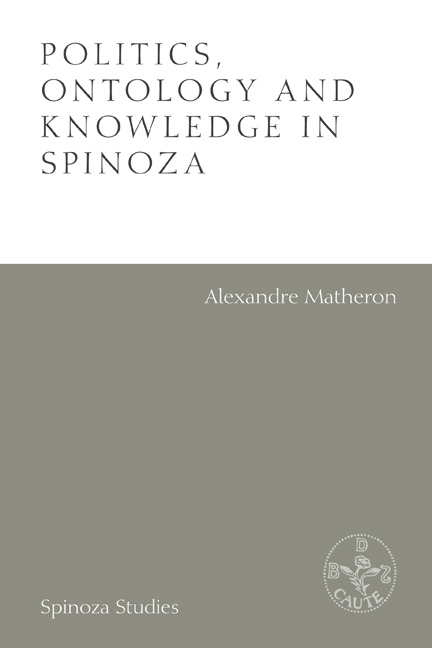Book contents
- Frontmatter
- Contents
- Abbreviations
- Notes on Translation and Acknowledgements
- A Revolutionary Beatitude: Alexandre Matheron’s Spinozism
- I Spinoza on Ontology and Knowledge
- 1 Idea, Idea of the Idea and Certainty in the Tractatus de Intellectus Emendatione and the Ethics
- 2 Essence, Existence and Power in Part I of the Ethics: The Foundations of Proposition 16
- 3 Physics and Ontology in Spinoza: The Enigmatic Response to Tschirnhaus
- 4 The Year 1663 and the Spinozist Identity of Being and Power: Hypothesis on a Development
- 5 Eternal Life and the Body According to Spinoza
- 6 Intellectual Love of God, Eternal Part of the amor erga Deum
- II Spinoza on Politics and Ethics
- 7 State and Morality According to Spinoza
- 8 Ethics and Politics in Spinoza (Remarks on the Role of Ethics IV, 37 Scholium 2)
- 9 Indignation and the Conatus of the Spinozist State
- 10 Passions and Institutions According to Spinoza
- 11 The Problem of Spinoza's Evolution: From the Theologico-Political Treatise to the Political Treatise
- 12 Is the State, According to Spinoza, an Individual in Spinoza’s Sense?
- 13 The Ontological Status of Scripture and the Spinozist Doctrine of Individuality
- 14 Spinoza and Power
- 15 Spinoza and Property
- 16 Spinoza and Sexuality
- 17 Women and Servants in Spinozist Democracy
- 18 The ‘Right of the Stronger’: Hobbes contra Spinoza
- 19 The Theoretical Function of Democracy in Spinoza and Hobbes
- 20 Spinoza and the Breakdown of Thomist Politics: Machiavellianism and Utopia
- Appendix 1 Interview with Laurent Bove and Pierre-François Moreau
- Appendix 2 Chronology of Works by Matheron
- Works Cited
- Index
4 - The Year 1663 and the Spinozist Identity of Being and Power: Hypothesis on a Development
Published online by Cambridge University Press: 03 October 2020
- Frontmatter
- Contents
- Abbreviations
- Notes on Translation and Acknowledgements
- A Revolutionary Beatitude: Alexandre Matheron’s Spinozism
- I Spinoza on Ontology and Knowledge
- 1 Idea, Idea of the Idea and Certainty in the Tractatus de Intellectus Emendatione and the Ethics
- 2 Essence, Existence and Power in Part I of the Ethics: The Foundations of Proposition 16
- 3 Physics and Ontology in Spinoza: The Enigmatic Response to Tschirnhaus
- 4 The Year 1663 and the Spinozist Identity of Being and Power: Hypothesis on a Development
- 5 Eternal Life and the Body According to Spinoza
- 6 Intellectual Love of God, Eternal Part of the amor erga Deum
- II Spinoza on Politics and Ethics
- 7 State and Morality According to Spinoza
- 8 Ethics and Politics in Spinoza (Remarks on the Role of Ethics IV, 37 Scholium 2)
- 9 Indignation and the Conatus of the Spinozist State
- 10 Passions and Institutions According to Spinoza
- 11 The Problem of Spinoza's Evolution: From the Theologico-Political Treatise to the Political Treatise
- 12 Is the State, According to Spinoza, an Individual in Spinoza’s Sense?
- 13 The Ontological Status of Scripture and the Spinozist Doctrine of Individuality
- 14 Spinoza and Power
- 15 Spinoza and Property
- 16 Spinoza and Sexuality
- 17 Women and Servants in Spinozist Democracy
- 18 The ‘Right of the Stronger’: Hobbes contra Spinoza
- 19 The Theoretical Function of Democracy in Spinoza and Hobbes
- 20 Spinoza and the Breakdown of Thomist Politics: Machiavellianism and Utopia
- Appendix 1 Interview with Laurent Bove and Pierre-François Moreau
- Appendix 2 Chronology of Works by Matheron
- Works Cited
- Index
Summary
Bernard Rousset entitled one of his last articles ‘The Implications of the Spinozist Identity of Being and Power’. He showed, beginning with his major book, The Final Perspective of the Ethics and the Problem of the Coherence of Spinozism, to what extent the concept of this identity was at the very heart of Spinoza's doctrine. But he also showed, beginning with this same work, that this concept did not simply arrive immediately in its fully articulated form, but rather that Spinoza progressively shifted from the language of participation to that of power [puissance]. Subsequently, in order to pinpoint this development more precisely, Rousset devoted many articles, always pertinent and lucid in my opinion, to determining the successive stages of the drafting of the Ethics. And his last book on Spinoza addressed the role played by Spinoza's reading of the Objections and Replies to Descartes’ Meditations. In the present chapter, I will attempt to follow Spinoza's reading of Descartes along the different paths that have since been opened, by situating myself, as it were, at their intersection. I will try to suggest that Spinoza was able to explicitly formulate this identity of being and power after a period of reflection on two of his own texts, which he undertook in 1663 – the first propositions of the Ethics and then Proposition 7 of the Principles of Cartesian Philosophy – and which led him to transform a proof for the existence of God, which has since disappeared from the text, into the one that is currently found in the Scholium to Proposition 11 of Part I of the Ethics.
We know that the drafting of the first eight propositions of the Ethics contained at least five steps: Chapter II of Part I of the Short Treatise; Appendix I of the Short Treatise; the text sent to Oldenburg in 1661 and which it is possible to reconstitute from Letters II and IV; a first version of the Ethics, different than the final version, and which is known to us from Spinoza’s correspondence with De Vries (Letter VIII from De Vries and Letter IX from Spinoza) dated February 1663; and finally the Ethics as we know it today.
- Type
- Chapter
- Information
- Politics, Ontology and Knowledge in Spinoza , pp. 50 - 67Publisher: Edinburgh University PressPrint publication year: 2020



